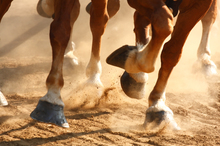Daily aches and pains are one of the biggest problems we deal with as we get older, but they are also very common in the equine athlete. The aches and pains are often associated with joint deterioration on many levels with resulting cartilage degeneration, which creates discomfort.

Better care for your horse's joints
As the equine athlete's joint wears, we have a degenerative process that begins in the soft tissue structures of the joint, and then progresses deeper, impacting the cartilage and bone.
Most people and horse owners resort to traditional joint therapies including glucosamine and chondroitin, in addition to pain medications and even joint injections. Despite these efforts, many are still seeking options to help get to the next level of comfort and soundness. Let's take a look at what is going on and what other options may be available to assist.
The joint is essentially the meeting point of two bones, in which there is motion. The bone ends are covered with articular cartilage, which cushions movement and absorbs forces. The joint is enclosed by a capsule of tissue which produces and contains fluid that lubricates and nourishes the contained tissues, including cartilage.
Joint wear is typical, but is accelerated by increased wear and abuse, which is common in athletes and in those performing repetitive movements. As the joint wears, we have a degenerative process that begins in the soft tissue structures of the joint, and then progresses deeper, impacting the cartilage and bone.
Joint degeneration leads to: (in a progressive manner)
- Joint capsule irritation
- Joint capsule thickening and fibrosis
- Decreased production of joint fluid
- Decreased nourishment of tissues
- Cartilage wear and deterioration
- Cartilage breakdown
- Subchondral bone exposure
- Bone remodeling
Seeing as how this is a progressive condition, ideally we would intervene at the early stages to gain control, but unfortunately, most people are reactive more than pro-active. Often, as result, joint damage is advanced and impacting range of motion and overall soundness.
Modern research indicates that chronic inflammation is often not only a result of joint deterioration, but also a potential instigator, brought on by many factors including stress, diet, environmental factors, exercise and genetics. This ongoing or uncontrolled inflammatory process contributes to cellular changes, which impact deterioration rates, bone resorption and discomfort.
Most traditional joint supplements are only really replacing what is being lost as a result of the inflammatory process. With heightened levels of inflammation, nourishment to the joint tissues is impacted and thus, many try to replace these nutrients in one manner or another. In actuality, a better approach may be to manage or control the inflammatory response, which then secondarily may improve joint health and function.
So, how to we help to support a healthy inflammatory response?
Various herbs and nutrients including Curcumin, Boswellia, Ashwaghanda, Vitamin C and Omega Fatty Acids have all been shown to modulate the inflammatory process in research abstracts. They achieve these results by down regulating the production of various pro-inflammatory proteins, which contribute to cellular changes and degeneration.
Through the process of addressing and managing the inflammatory process, patient comfort can be improved, but is still dependent on the degree of joint deterioration present. Often, the results can be far superior through changes in diet and targeted supplementation, as compared to those with traditional joint supplements. Here again, we are not replacing what is being lost but more so targeting the cause of the loss of those nutrients.
If you are desiring more from your joint supplement for your horse, consider taking a different strategy, which could make all of the difference.
This is an excerpt from an article written by Dr. Tom Schell of Nouvelle Research, Inc. The full article can be read at:
http://nouvelleresearch.com/index.php/articles/362-why-your-joint-supplement-may-not-be-working
